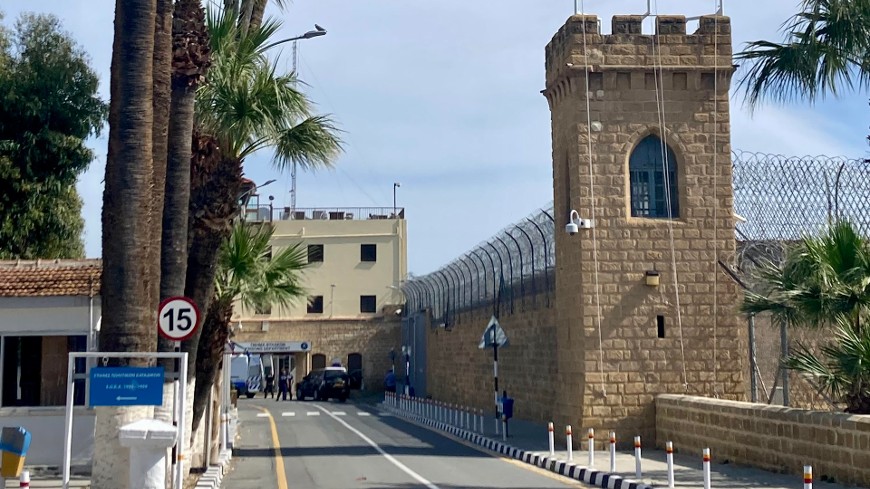The main objective of the visit was to examine the treatment and conditions of detention of persons in Nicosia Central Prisons and of persons held under immigration legislation, including at the Menoyia Detention Centre and the Pournara Registration Centre. The visiting delegation also examined the treatment of persons deprived of their liberty by the police.
The situation for persons held in the prison had significantly deteriorated since the CPT’s previous visit in 2017. Increased levels of overcrowding have led to poor living conditions and increased levels of inter-prisoner violence. The lack of front-line operational prison staff only exacerbated the situation. The overcrowding was a result of a number of factors, including the accommodation of significant numbers of persons held for short sentences and high numbers of persons on remand. The report recommends that an urgent review of the grounds for imprisonment of these groups should be undertaken along with the application of many more alternatives to detention to decongest the prison.
The vast majority of prisoners did not complain to the delegation about ill-treatment by staff. However, a number of allegations were received of staff slapping prisoners as an informal punishment for being late back to their cells. Further, various allegations were received of verbal, including racist, abuse towards foreign national prisoners by staff. Equally, there were several cases of serious inter-prisoner violence, including the murder of a prisoner in October 2022. By consequence, many prisoners feared for their own safety. The CPT found that insufficient measures were being taken to effectively discharge the prison’s obligation to keep prisoners – and staff – safe and to reduce inter-prisoner violence. In addition, the lack of front-line prison staff created a breeding ground for the development of informal prisoner hierarchies for certain prisoners to maintain control and enforce discipline over other prisoners. The CPT recommended the swift recruitment and training of more front-line prison staff and for more emphasis to be placed on promoting a dynamic security approach with increased personal interaction between staff and prisoners.
The CPT found large numbers of prisoners sleeping on mattresses on the floor, under the bunk beds, under the tables and in every available space within the cells. There was also a lack of ready access to toilets at night, linked to the lack of staff available to let prisoners out of their cells to use the toilets, which resulted in prisoners urinating in bottles. Prisoners also had nothing meaningful to do to structure their day. In the CPT’s view, the appalling material conditions and lack of regime cumulatively can only be described as amounting to inhuman and degrading treatment. Concerted action is urgently needed to address these problems.
The CPT found that police stations across Cyprus were holding administratively detained persons held pursuant to the aliens legislation, criminal suspects, and even some sentenced prisoners. Lengths of stay at police stations ranged from a few days to months. The report reiterates that persons should not be detained in police custody for prolonged periods. The majority of persons with whom the CPT delegation spoke said that they had been treated correctly by the police. While the delegation received no allegations of physical ill-treatment by police officers during their custody in police stations, it did receive a few allegations relating to the time of apprehension and questioning by police investigators. The CPT underlines the need to reinforce a zero-tolerance approach as regards ill-treatment.
At the Menoyia Immigration Detention Centre, no allegations of physical ill-treatment by staff were received. The overall living conditions, however, remained too carceral for the nature of the Centre. Detained persons had nothing to structure their days and were only allowed one and a half hours of daily access to the fresh air.
Pournara Registration Centre was accommodating more than 1 000 foreign nationals at the time of the CPT delegation’s visit, many of whom were waiting several weeks and months before they were allowed to leave the Centre. Foreign nationals were accommodated in severely overcrowded living conditions in either prefabricated plastic containers, plastic shelters or tents. Much of the accommodation was in a dilapidated condition, with broken doors and earth floors and was poorly ventilated, mouldy and humid. Persons placed in containers, including children, were often forced to share beds and dirty sheets. In the tented section, there was a lack of electricity and hot water. Persons were forced to sleep on worn-out mattresses or directly on bedsheets placed on the ground, crammed next to each other. The toilets and showers were dilapidated causing the water to leak all around, including outside, creating stagnant puddles. Some residents refused to use the dirty toilets and showers and instead used the communal outside areas for their toilet needs, resulting in piles of excrement and rivulets of urine. In the CPT’s view, such living conditions may well amount to inhuman and degrading treatment and made recommendations to address these issues urgently.
In its report, the CPT urges the Cypriot authorities to take immediate action to provide decent living conditions, in particular, to unaccompanied and separated children, as well as to vulnerable categories of persons such as single mothers with small children, elderly and sick persons and survivors of sexual and gender-based violence. The CPT welcomes the information provided in the Cypriot authorities’ response regarding the plans for refurbishment of parts of Pournara, as well as the action taken by the Cypriot authorities subsequent to the CPT’s visit to remove a number of vulnerable persons from Pournara. Nevertheless, the Committee remains deeply concerned that many such vulnerable groups still remained in Pournara.
In their response, the Cypriot authorities provide information on the measures taken to implement the recommendations made in the CPT’s report regarding the prison, police custody and the immigration establishments visited.
The CPT report and the response of the authorities have been made public at the request of the Government of Cyprus.



